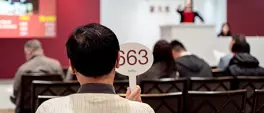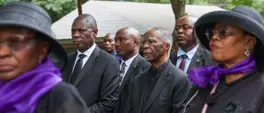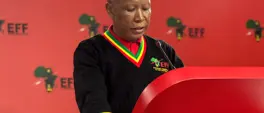MOLLO BALOYI: SA’s G20 presidency may be a lifeline for the disabled population
Mollo Baloyi
4 December 2024 | 8:58The country’s current trajectory will continue to castigate disabled people as helpless, but there is light at the end of the tunnel, writes Mollo Baloyi.
“The test of a civilisation is in the way that it cares for its helpless members” - Pearl Buck.
On 3 December, South Africa joined the rest of the world in marking the International Day of Persons with Disabilities, highlighting this year’s theme, ‘Amplifying the leadership of persons with disabilities for an inclusive and sustainable future’.
In 2025, South Africa will lead the G20, after taking over from Brazil. This is significant as it continues the Global South leadership, but more so as it will be an African country at the helm, strategically influencing this collective of formidable economies.
Through the leadership of President Cyril Ramaphosa, South Africa’s G20 Presidency will focus on the theme of solidarity, equality, and sustainable development. This lens brings to light much of the National Development Plan: Vision 2030 (NDP).
Interestingly, South Africa assumed the Presidency on 1 December 2024, a day marking World Aids Day, and two days before the International Day of Persons with Disabilities. These are poignant coincidences that can and should give impetus to the acceleration of the country’s inclusion agenda by ensuring persons with disabilities' potential for leadership is developed in step with that of the country.
The NDP highlights three key areas to be addressed by long-term strategic planning: unemployment, poverty, and inequality. While, 30 years into democracy, these social ills unfortunately affect far too many of the country’s citizens in general, they affect persons with disabilities of working age disproportionally.
Presenting as some of the most vulnerable in society, people with physical, mental, and sensory impairments must compete for resources to escape the triplicate scourges, while at the same time dealing with inadequate opportunities for education and skills training that greatly contribute to their exclusion from market participation.
To give effect to South Africa’s rights-based Constitution, its legislation and policies include provisions that ensure that these rights are extended fairly to persons with disabilities. The legislative provision is captured in Section 47 of the Employment Equity Act of 1998, which specifies a target of 2% of the workforce for Affirmative Action and work opportunities for persons with disabilities.
However, there is a prevailing view that this target is outdated and wholly misaligned with the actual prevalence of disabled people in the country, which is around 7.5% as indicated in the 2022 Census. Regardless, it would appear that even this 2% quota has not been realised nationally.
It is important to note, however, that certain provincial departments seem to have made some inroads in meeting or even exceeding the target, which is a very welcome demonstration of living the mandate by the public sector.
According to the 2022 Employment Equity report, various departments in the Free State employed over 5%, including the Department of Social Development (DSD) at 5.11% and the Department of Women, Youth and Persons with Disabilities (DWYPD) at 5.0.7%, and the Office of the Premier in Mpumalanga has reportedly also exceeded the target, reaching over 4%.
The Gauteng province must be commended for being the only province to meet the 2% disability employment target across all its departments.
As part of guaranteeing rights through policy, the Employment Equity Code of Practice on the employment of designated groups, including disabled people, in Expanded Public Works Programmes (EPWPs) seeks to ensure the allocation of work provisions. Recent data in this regard indicates that EPWPs have created work for about 1.2% of the economically active population of persons with disabilities.
As severely and intellectually impaired people require targeted assistance to secure employment, the workshops that allow persons with disabilities protected employment are vital. They should be exempt from tender processes that make them more competitive and, in so doing, again render people disabled by their environments where they have to compete against those who are not marginalised by their physical or mental condition.
There doesn’t appear to be readily available data on the employment of disabled people in the private sector, however, the Human Rights Commission’s Promoting the Right of Persons with Disabilities to Work - Tool Kit for the Private Sector asserts that the numbers are far lower than the 2% target.
In creating inclusive and accommodating environments for disabled people to live independently and have access to services, efficiencies, and optimisation of delivery is key. This will undoubtedly enable and empower disabled people to feel like valued members of society with the ability to exercise rights enshrined in the Constitution.
There does appear to be light at the end of the tunnel. In a parliamentary response in 2023, the DWYPD and DSD laid out various strategies and programmes to widen the net for the inclusion of disabled people and children.
The DSD highlighted that the Integrated Strategy on Support Services to Children with Disabilities, which is in line with the 2005 Children’s Act, has been developed to enable the integration and mainstreaming of children with disabilities into programmes in and outside the department. In the 2023/24 financial year, the DWYPD focused on developing a framework for community-based services to support independent living.
It is important to underscore the desire of persons with disabilities to work and to be fully participative and contributory members of society. This is echoed in Chapter 11 of the NDP on Social Protection, which states the need for employment of persons with disabilities, to confer status, economic security, and the opportunity to access social networks.
With most disabled women and most disabled young people unemployed, it is rather difficult to see where we amplify the strengths of disabled people. Instead, the current trajectory will continue to castigate disabled people as helpless and have to constantly make a case for inclusion to the dominant groups.
The impact of an ecosystem that is effective and conscious should yield positive and sustainable outcomes that are conducive to a display of leadership by citizens in whatever role they occupy, and to the full realisation of social citizenship.
The G20 Presidency affords us an opportunity to put our best foot forward, amplifying the successes of those who have stared down adversity, overcome apparent ‘limitations’, and pulled through against disabling circumstances.
Standing in solidarity with persons with disabilities, let’s shift our attitudes to ensure the pooling of all our diversity for an inclusive and sustainable future.
Makhiba Mollo Baloyi is a commissioner of the National Planning Commission and writes in her personal capacity.
Get the whole picture 💡
Take a look at the topic timeline for all related articles.















